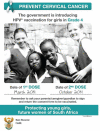Human Papillomavirus Vaccine Introduction in South Africa: Implementation Lessons From an Evaluation of the National School-Based Vaccination Campaign
- PMID: 30143561
- PMCID: PMC6172125
- DOI: 10.9745/GHSP-D-18-00090
Human Papillomavirus Vaccine Introduction in South Africa: Implementation Lessons From an Evaluation of the National School-Based Vaccination Campaign
Abstract
Background: In April 2014, a national school-based human papillomavirus (HPV) vaccination program was rolled out in South Africa, targeting Grade 4 girls aged ≥9 years. A bivalent HPV vaccine with a 2-dose (6 months apart) schedule was used. At the request of the National Department of Health (NDoH), we conducted an external assessment of the first-dose phase of the vaccination program to evaluate program coverage and vaccine safety and identify factors that influenced implementation.
Methods: We based our cross-sectional and mixed-methods approach on a process evaluation framework, which included a review of key planning and implementation documents and monitoring data; observation at vaccination sites; key informant interviews (N=34); and an assessment of media coverage and content related to the campaign.Findings: There was overall success in key measures of coverage and safety. Over 350,000 Grade 4 girls were vaccinated in more than 16,000 public schools across South Africa, which translated to 94.6% of schools reached and 86.6% of age-eligible learners vaccinated. No major adverse events following immunization were detected. We attributed the campaign's successes to careful planning and coordination and strong leadership from the NDoH. The primary challenges we identified were related to obtaining informed consent, vulnerabilities in cold chain capacity, and onsite management of minor adverse events. While campaign planners anticipated and prepared for some negative media coverage, they did not expect the use of social media for spreading misinformation about HPV vaccination.
Conclusions: The first phase of the national school-based HPV vaccination campaign was successfully implemented at scale in this setting. Future implementation will require improvement in the storage and monitoring of vaccine doses, better communication of role expectations to all stakeholders, and streamlined consent processes to ensure program sustainability.
© Delany-Moretlwe et al.
Figures
Similar articles
-
Implementation of a human papillomavirus vaccination demonstration project in Malawi: successes and challenges.BMC Public Health. 2017 Jun 26;17(1):599. doi: 10.1186/s12889-017-4526-y. BMC Public Health. 2017. PMID: 28651574 Free PMC article.
-
Challenges, lessons learned and results following the implementation of a human papilloma virus school vaccination program in South Australia.Aust N Z J Public Health. 2009 Aug;33(4):365-70. doi: 10.1111/j.1753-6405.2009.00409.x. Aust N Z J Public Health. 2009. PMID: 19689598
-
Lessons learnt during the national introduction of human papillomavirus (HPV) vaccination programmes in 6 African countries: Stakeholders' perspectives.S Afr Med J. 2020 May 29;110(6):525-531. doi: 10.7196/SAMJ.2020.v110i6.14332. S Afr Med J. 2020. PMID: 32880566
-
National introduction of human papillomavirus (HPV) vaccine in Tanzania: Programmatic decision-making and implementation.Vaccine. 2022 Mar 31;40 Suppl 1(Suppl 1):A2-A9. doi: 10.1016/j.vaccine.2021.04.025. Epub 2021 May 4. Vaccine. 2022. PMID: 33962839 Free PMC article. Review.
-
Human papillomavirus vaccine introduction--the first five years.Vaccine. 2012 Nov 20;30 Suppl 5:F139-48. doi: 10.1016/j.vaccine.2012.05.039. Vaccine. 2012. PMID: 23199957 Review.
Cited by
-
Predictors of COVID-19 Vaccine Hesitancy in South African Local Communities: The VaxScenes Study.Vaccines (Basel). 2022 Feb 25;10(3):353. doi: 10.3390/vaccines10030353. Vaccines (Basel). 2022. PMID: 35334991 Free PMC article.
-
Assessing national cervical cancer screening guidelines: Results from an HIV testing clinic also screening for cervical cancer and HPV in Soweto, South Africa.PLoS One. 2021 Jul 30;16(7):e0255124. doi: 10.1371/journal.pone.0255124. eCollection 2021. PLoS One. 2021. PMID: 34329334 Free PMC article.
-
The prevalence of human papillomavirus in ocular surface squamous neoplasia in HIV positive and negative patients in a South African population.Infection. 2024 Aug;52(4):1547-1552. doi: 10.1007/s15010-024-02289-8. Epub 2024 May 9. Infection. 2024. PMID: 38724852 Free PMC article.
-
National implementation of HPV vaccination programs in low-resource countries: Lessons, challenges, and future prospects.Prev Med. 2021 Mar;144:106335. doi: 10.1016/j.ypmed.2020.106335. Epub 2021 Mar 4. Prev Med. 2021. PMID: 33678232 Free PMC article. Review.
-
High prevalence of and factors associated with human papillomavirus infection among women attending a tertiary hospital in Gauteng Province, South Africa.BMC Cancer. 2022 Aug 5;22(1):854. doi: 10.1186/s12885-022-09964-9. BMC Cancer. 2022. PMID: 35931978 Free PMC article.
References
-
- Kelly HA, Ngou J, Chikandiwa A, et al. ; HARP Study Group. Associations of Human Papillomavirus (HPV) genotypes with high-grade cervical neoplasia (CIN2+) in a cohort of women living with HIV in Burkina Faso and South Africa. PLoS One. 2017;12(3):e0174117. 10.1371/journal.pone.0174117. - DOI - PMC - PubMed
Publication types
MeSH terms
Substances
Grants and funding
LinkOut - more resources
Full Text Sources
Other Literature Sources
Medical
Miscellaneous

